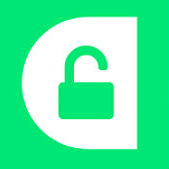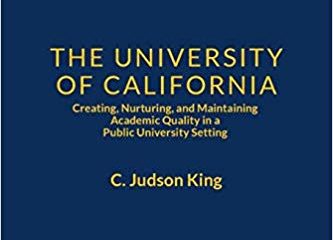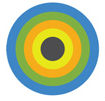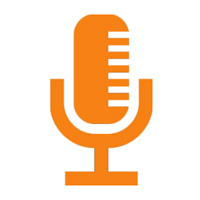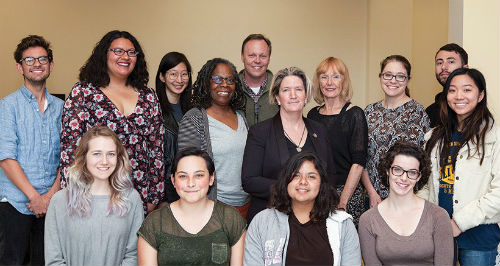Features
-
Open Alternatives to Subscription Content
The University of California Libraries are committed to seamlessly connecting UC faculty, students, and staff with research collections. While established tools such as UC-eLinks for paywalled/subscription literature and Request Interlibrary Loan Service for unsubscribed content have been connecting readers with scholarly content for decades, a range of new tools have emerged in recent years to improve access to and discovery of both subscription and open access (OA) publications. Paywalled content requires subscriber authentication or pay-per-view for unsubscribed content, whereas OA content is freely accessible to all readers. While the majority of scholarly publications are still published behind a paywall, the […]
-
Interview with Jud King: an author’s perspective on the rewards and challenges of open access book publishing
Jud King is Provost and Senior Vice President, Emeritus of UC, as well as former Provost – Professional Schools and Colleges, Dean of the College of Chemistry, Director of the Center for Studies in Higher Education, and Professor Emeritus of Chemical and Biomolecular Engineering at Berkeley. He has recently written a book¹ on the entire University of California, exploring “the structural, policy, operational, and environmental matters that have contributed to [its] success…” Published by the Berkeley campus Center for Studies in Higher Education in January, 2018, the book is both open-access and, essentially, self-published. We asked Jud to reflect on […]
-
A scalable solution to a sizable problem: UCP, CDL & Coko’s journey toward Editoria
Despite the emergence, over the past few decades, of elaborate and powerful new forms of digital communication, the scholarly publishing industry is still struggling to fully realize the benefits of digital workflows. With growing demands for increased speed to publication and cost savings, publishers continue to face challenges imposed by outmoded and unwieldy systems designed for print-centric workflow. No place is this more evident than in the realm of book production. In an effort to address these challenges, University of California Press and California Digital Library have partnered with the Coko Foundation, supported by funding from the Mellon Foundation, to […]
-
Pathways to Open Access: Choices and Opportunities
A Call to Action On June 21, the University of California’s Systemwide Library and Scholarly Information Advisory Committee (SLASIAC) issued a Call to Action here on this blog in which they announced their intent to embark on a new phase of activity in journal negotiations focused on open access (OA) to research. The Call to Action appeared alongside discussion of another recently-released University of California document, the Declaration of Rights and Principles to Transform Scholarly Communication, put forth by our system-wide faculty senate library committee (UCOLASC) and intended to guide our libraries toward OA when negotiating with publishers. There are […]
-
Open Mic: L2 Journal editors on the rapidly growing field of applied linguistics, the challenges of transhumanism, and the power of open access
Open Mic is a new, informal interview series with editors of open access journals, offering insider perspectives on publishing culture across disciplines and fields. In this Open Mic interview with UC Berkeley’s L2 Journal of applied linguistics, we spoke with founder, General Editor, and Professor of German Claire Kramsch; Managing Editor and French Department PhD student Emily Linares; and Mark Kaiser, Associate Director of the Berkeley Language Center, which sponsors the journal, and creator of the BLC Library of Foreign Language Film Clips. (The original sponsor of L2 Journal was the UC Consortium for Language Learning & Teaching.) To start […]
-
Research Impact & Scholarly Profiles
This post on Research Impact & Scholarly Profiles was created by UC Berkeley Library Scholarly Communications Services, and is available under a Creative Commons Attribution-Noncommercial 4.0 License. It has been modified for inclusion on the UC OSC site by removing references to Berkeley-specific resources. Why are we talking about impact? Among other things, awareness of your scholarly impact can help you: Measuring Your Impact Measuring impact is not a perfect science, and there are many who argue against its implications altogether. Here, we just want to present information about the statistical measures that exist so that you can make informed decisions about […]
-
Arnhold-Punctum Publishing Lab at UCSB Library: A Case Study in Library-Publisher Collaboration
I think we are dealing with massive uncertainty in almost every sphere at this point…Effective collaborations are going to be especially important now. Clifford Lynch, Coalition for Networked Information December 2017 Member Meeting At the Arnhold-Punctum Publishing Lab at UCSB Library, undergraduate students are doing the work of publishing scholarly monographs. The unusual cohort of academics responsible for the launch and success of this Lab believes that the future of scholarly publishing is a collaborative, community-based, mission-driven, and service-oriented endeavor that engages teams with a range of skills, knowledge, expertise, and resources. But, before I get too far ahead of […]
-
Reputation managment: your identity, your story
Unless you are a CIA operative or completely off the grid, you are very likely to have some sort of digital footprint beyond your published articles and departmental faculty profile. This can be a good thing if, for example, you are: entering the job market or looking for collaborators in interdisciplinary research; applying for a major research grant; hoping the media will call you for an expert opinion in your field of study; trying to reach the public and/or policy makers who are misunderstanding (and defunding) the research being done in your field. Having a digital presence beyond your formal […]
-
Redundancy is resistance: share your scholarship
Who has the right to make your scholarship available? Who is able to read it? And who can disappear it? If you haven’t given these questions much thought to date, it is worth having a fresh look as national conversations about the power of information—and the awful power of misinformation—continue to grow in prominence. It is a bleak testament to the importance of the academic enterprise that the ways in which scholarship is made and accessed are disputed territory in the campaign against facts.
-
Statement on Commitment to Free and Open Information, Scholarship, and Knowledge Exchange
The University of California Office of Scholarly Communication (OSC) and the University of California Libraries issue the following statement in response to recent actions by the new federal administration and in order to address resulting concerns about continued open access to and preservation of information, scholarship, and knowledge. The unfettered exchange and careful preservation of information are fundamental to democracy, progress, and intellectual freedom. The critical research and scholarship conducted by government entities and academic institutions worldwide safeguard and support human rights, public health, the environment, artistic and literary enterprise, scientific and technological innovation, and much more. This scholarship is […]
